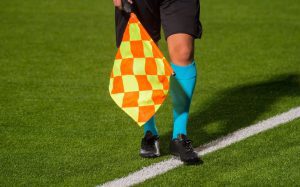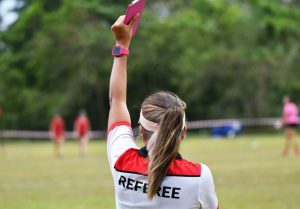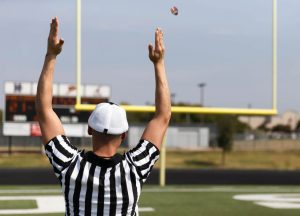To become a referee is a great opportunity if you are a sports fan and want to be involved in the action, provided you are good at decision-making. Referees are an essential part of any sport. Whether it’s football, basketball or rugby, referees are responsible for ensuring the game is fair, within the rules and is played safely. They enforce the sport’s rules, make calls and decisions, and manage the game’s flow. In this guide, I will highlight the steps to becoming a referee, the qualifications required, and the key skills you need to succeed.
What Does a Referee Do?
To become a referee, you are present at sports games to ensure they are played according to the rules and regulations of the sport. Their jobs include:
- Keeping Rules: To become a referee, you decide if players have broken the game’s rules and can impose on-the-spot punishment.
- Managing the Game: The referees manage the puck. They start and stop the game as necessary, keeping it on time and on task.
- Keeping the Game Safe: To become a referee, you keep the game safe by identifying dangerous play and making sure players abide by the rules that are conducive to preventing injuries.
- Judgment Calls: To become a referee, you must make split-second on-field decisions about whether a goal counts, whether a player is in an offside position, whether a player committed a foul, and whether a penalty should be awarded.
- Communicate with Players and Coaches: To become a referee, you must communicate with players, coaches, and, sometimes, spectators, explaining decisions when necessary.
- Penalty: If a player breaks a rule or commits a foul, the referee gives the appropriate penalty, such as a free kick, a yellow or red card, or a loss of points.

Types of Referees
To become a referee, you work in different types of sports, and each sport might have slightly different requirements. The most common types of referees are:
- Football Referee: This person umpires and enforces the rules of football (soccer) during matches, controlling the game and calling fouls and misconduct.
- Basketball Referee: Oversees a basketball game, calling for fouls, violations and other game actions.
- Rugby Referee: Oversees the flow of rugby matches, implementing rules on tackling, scrummaging, line-outs, and ensuring player safety.
- Tennis umpire: He oversees tennis matches, ruling whether the ball is in or out and ensuring that players follow the game’s rules.
- Cricket Umpire: Umpires a cricket match, ruling on ball runs, appeals for wickets, and maintaining fair play.
Average Referee Salary in the UK
The pay of a referee in the UK depends on the sport and the level of competition. To become a referee who referees amateur or local league matches is normally paid between 20£ and 40 £ for each game.
This rate increases the more experience the referee has and the higher the level at which they officiate—national or professional leagues being the highest levels. Mid-level referees officiating at semi-professional leagues earn between £100 and £500 per game, and professional referees in sports such as football or rugby earn over £1,000 per match. Elite referees in top professional leagues or international competitions typically earn far more, with annual salaries of £40,000-£70,000 or more.

Key Skills for a Successful Referee
Being a good referee depends on technical knowledge – understanding the rules of the sport; on physical fitness – you need to run a lot; and on interpersonal skills – you need to be able to handle the players’ emotions. The key skills of a referee are:
- Thorough Knowledge of the Rules: Officiating at any level demands referees to have a thorough knowledge of the sports’ rules and regulations.
- Ability to decide fast: During the game, the referee must make quick judgment calls. To become a referee, you must be capable of making good decisions fast to keep the game under control.
- Physical fitness: To become a referee, you need to be physically fit because running after players is an inherent part of the game. They also need to be in a position to make the right call, which directly affects the outcome of the game.
- Communication Skills: To become a referee, you must communicate with players, coaches, and other referees, explaining decisions and calming down potentially volatile situations.
- Confidence and Authority: For the game to flow, referees must be confident in their decisions and exert control over the pitch.
- Keeping Calm Under Pressure: To become a referee, you often face tremendous pressure from players, coaches, and fans, so they need to keep their minds and bodies under control to make correct decisions and maintain their authority.
- Integrity and Fairness: To become a referee, you must officiate a game without showing favouritism and must call the game with integrity. All players must be treated equally.

Steps to Become a Referee in the UK
Here’s how you can become a referee in the UK:
- Choose a Sport: The first step to becoming a referee is deciding which sport you want to officiate. Different sports have different requirements and pathways for referees, so it’s important to choose a sport you’re passionate about and knowledgeable in.
- Complete the Required Training and Courses: Most sports governing bodies require aspiring referees to complete a formal training program or certification course. For example, in football, the Football Association (FA) offers refereeing courses at different levels, starting with the FA Referee Course for beginners. These courses cover the rules of the sport, refereeing techniques, and game management skills.
In rugby, you would need to complete the RFU (Rugby Football Union) Level 2 Refereeing the 15-a-side Game Course, while basketball referees can take the England Basketball Level 1 Referee Course. - Gain Practical Experience: After completing your initial referee training, you’ll need to gain practical experience by officiating in local leagues or youth matches. This will help you develop your refereeing skills, learn how to manage games, and build confidence in making decisions on the field.
You can volunteer to referee in school or community games, or join local sports associations that organize regular matches. - Register with the Governing Body: Once you’ve completed your training and gained some practical experience, you’ll need to register with the relevant sports governing body in the UK. For example, football referees register with The Football Association (FA), rugby referees with the RFU, and cricket umpires with the England and Wales Cricket Board (ECB).
Registration ensures you’re recognized as a qualified referee and can officiate in official league matches. - Climb the Refereeing Ladder: As you gain more experience, you can progress to officiating higher-level matches, including semi-professional or professional games. Each sport has its own pathway for advancing through the refereeing ranks. For example, football referees in the UK start in local leagues and can progress to refereeing in regional, national, and even international competitions.
Performance evaluations, experience, and ongoing training will help you move up the refereeing ladder. - Stay Up-to-Date with Rules and Regulations: Sports rules and regulations can change over time, so it’s essential to stay updated with any new developments. Attend refresher courses, workshops, and seminars offered by governing bodies to ensure you’re aware of the latest rules and refereeing techniques.

Tips for Aspiring Referees
- Maintain Fitness: Refereeing is a very physical job, so you need to stay in shape by participating in a regular exercise programme that includes cardio and strength training.
- Build Confidence: To become a referee, you must be confident in their calls. Getting better at making calls and speaking with authority helps build confidence on the field.
- Watch Professional Referees: Watch professional referees to learn how they manage games, communicate with players and make decisions. You can improve your style by learning from the pros.
- Practice Clear Communication: Good communication is vital to playing the ‘game’. Practice giving clear instructions to players and explaining your decisions clearly and calmly.
Frequently Asked Questions
Why Should You Become a Referee?
Working as a referee allows you to remain a part of the sport, hone leadership and judgment skills, and promote sportsmanship. There’s nothing better than earning a few bucks doing something you’re interested in, whether you’re refereeing amateur games or eventually calling the action in the professional ranks.
Is a Career as a Referee Right for You?
A refereeing career is ideal for those who enjoy sports, can make good decisions and stay calm under pressure.If you like being in the thick of things, know the rules, and would like to help ensure that the game is played as fairly and as enjoyable as possible, then refereeing may be for you.
What Are the Salary Prospects for Referees in the UK?
An entry-level referee in a local league might make between £20 and £40 per game. Earnings can dramatically increase at higher levels, such as semi-pro or pro leagues, with pro referees getting paid £1,000 or more per game. Elite referees at the top leagues and international competitions can earn £40,000 to £70,000 or more annually.
What Qualifications Are Needed to Become a Referee?
To qualify as a referee, you must undergo the relevant training and certification through the appropriate sports governing body. In the case of the FA Referee Course, in rugby, the RFU Level 2 Refereeing Course, and so on. There is a different governing body, and thus a different course, for each sport, so you must follow the pathway that leads to your chosen officiating activity. Aside from formal training, a referee must thoroughly know the sport’s rules and regulations.
Do You Need Work Experience to Start a Career as a Referee?
Yes, you will want to get some practical experience officiating to make your first jump into refereeing. The most appropriate place to start is probably by refereeing local or amateur matches – school matches, community leagues or youth competitions. Doing this will allow you to get used to the pressure of making decisions, the demands of controlling players and the need to adhere to the game’s laws. As you get more experienced, you can officiate at higher-standard matches.
What Is the Career Outlook for Referees?
The requirement for referees is consistent across sports and at all levels, from grassroots to top level. The career prospects for referees in the UK are good for successful ones. In particular, there are opportunities to officiate professionally in football, rugby and cricket. With hard work and experience, referees can progress to officiate at national and international levels, including in the Premier League or at the Rugby World Cup, for example.
What Are the Career Progression Options for Referees?
Referees can then progress to overseeing more professional levels – from a semi-professional level to the professional leagues to even international matches. As you gain experience and improve, you might be chosen to referee in the highest leagues and the most prestigious tournaments. Finally, some referees also move into other careers, such as referee assessors, instructors or administrators within sports organisations, where they can continue to educate new referees or help to establish or improve refereeing standards.
What Are the Exit Options and Opportunities Beyond the Referee Role?
Some move into roles as referee coaches, training and mentoring new referees. Others may train as referee assessors to evaluate referee performance during matches. Some become sports administrators or managers in governing bodies, in positions to influence the sport in a more holistic way. Some may move into commentary or analysis for sports media, where their deep understanding of the game can be leveraged into insightful on-air contributions.


